Unit1 How can we become good learners.SectionB 2a-2e课件 (共16张PPT)
文档属性
| 名称 | Unit1 How can we become good learners.SectionB 2a-2e课件 (共16张PPT) | 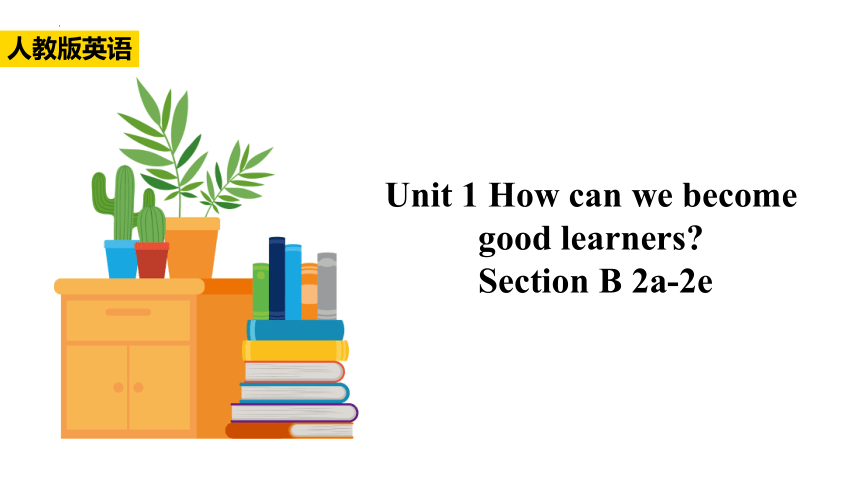 | |
| 格式 | zip | ||
| 文件大小 | 4.0MB | ||
| 资源类型 | 教案 | ||
| 版本资源 | 人教新目标(Go for it)版 | ||
| 科目 | 英语 | ||
| 更新时间 | 2022-08-08 16:51:29 | ||
图片预览

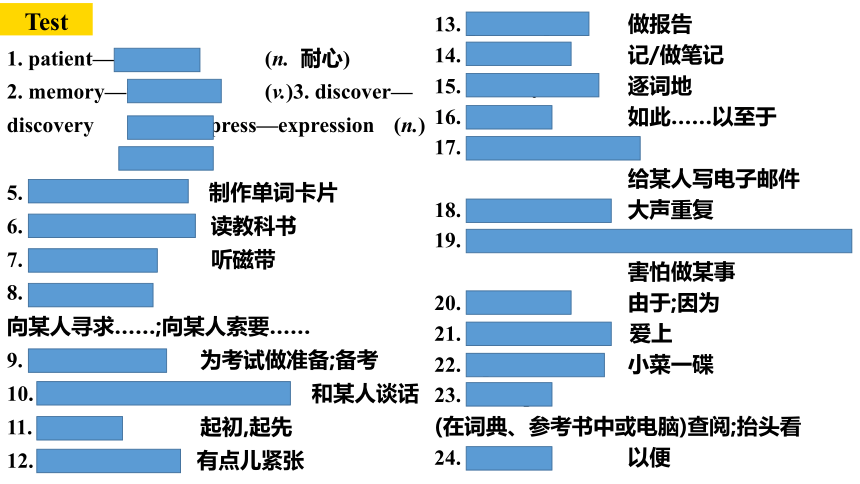
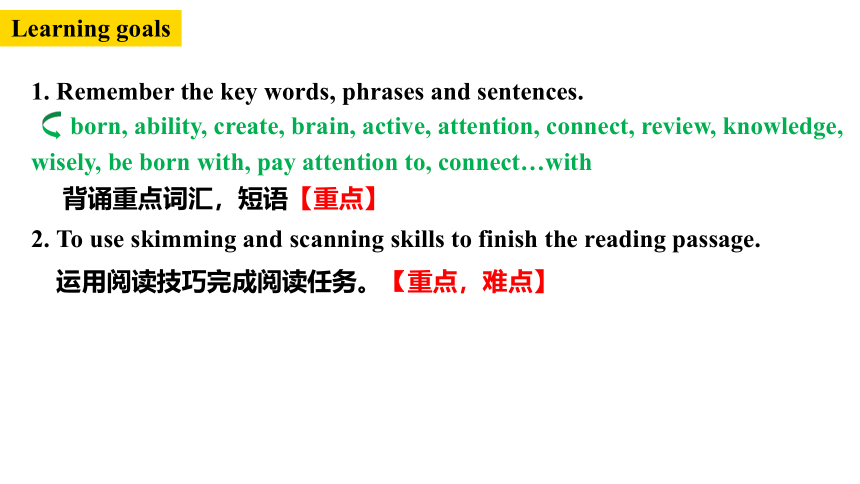
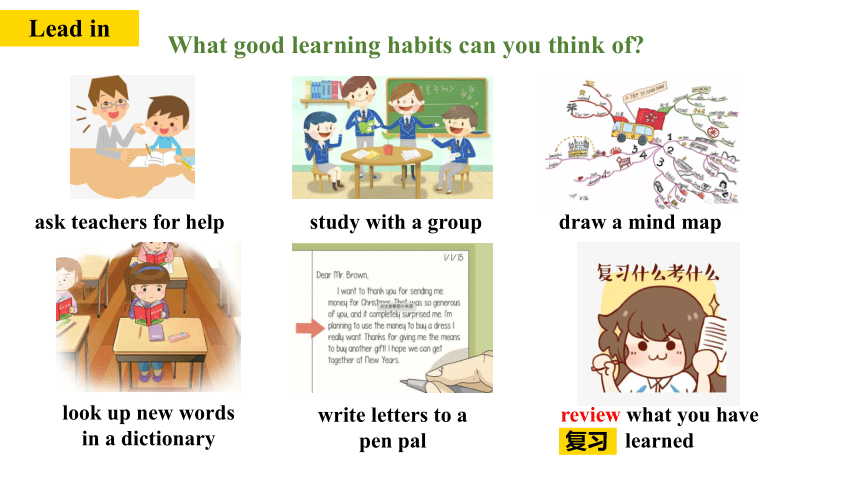
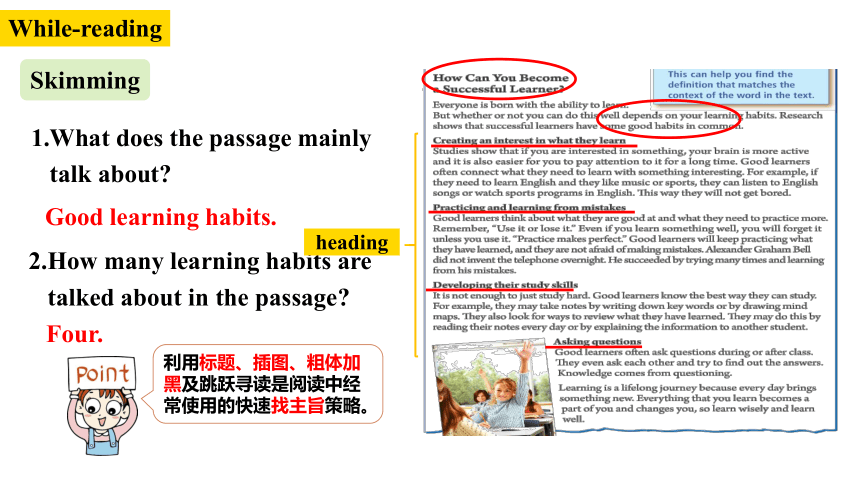
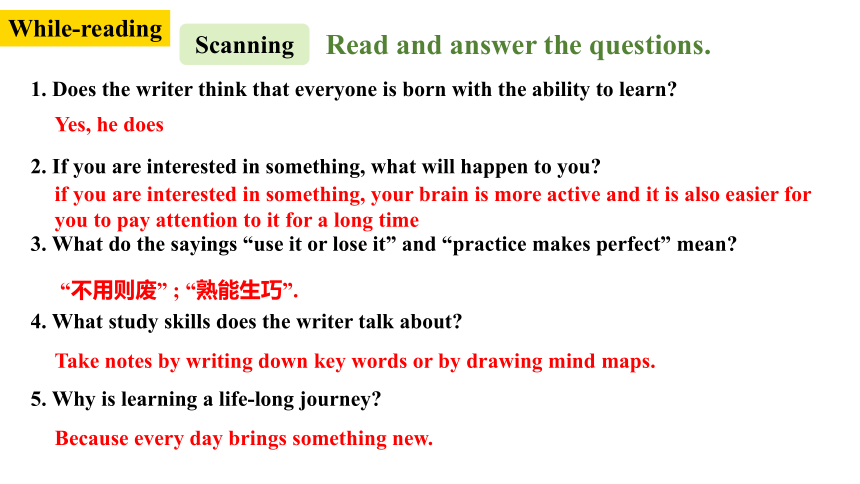
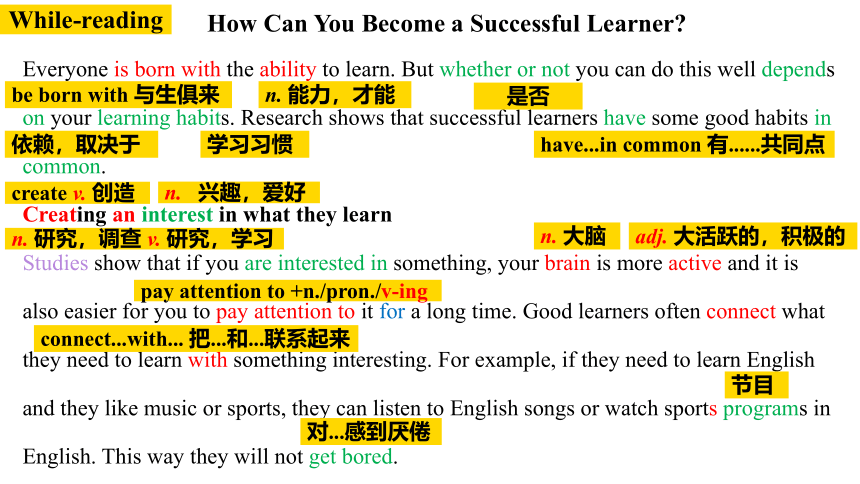
文档简介
(共16张PPT)
人教版英语
Unit 1 How can we become good learners
Section B 2a-2e
人教版英语
13. give a report 做报告
14. take notes 记/做笔记
15. word by word 逐词地
16. so…that 如此……以至于
17. write e-mails to sb.
给某人写电子邮件
18. repeat out loud 大声重复
19. be afraid to do sth./be afraid of doing sth. 害怕做某事
20. because of 由于;因为
21. fall in love with 爱上
22. a piece of cake 小菜一碟
23. look up
(在词典、参考书中或电脑)查阅;抬头看
24. so that 以便
1. patient—patience (n. 耐心)
2. memory—memorize (v.)3. discover—discovery (n.)4. express—expression (n.)
5. make word cards 制作单词卡片
6. read the textbook 读教科书
7. listen to tapes 听磁带
8. ask sb. for…
向某人寻求……;向某人索要……
9. study for a test 为考试做准备;备考
10. have conversations with sb. 和某人谈话
11. at first 起初,起先
12. a little nervous 有点儿紧张
Test
1. Remember the key words, phrases and sentences.
born, ability, create, brain, active, attention, connect, review, knowledge, wisely, be born with, pay attention to, connect…with
背诵重点词汇,短语【重点】
2. To use skimming and scanning skills to finish the reading passage.
运用阅读技巧完成阅读任务。【重点,难点】
Learning goals
Lead in
What good learning habits can you think of
ask teachers for help
study with a group
draw a mind map
look up new words in a dictionary
write letters to a pen pal
review what you have learned
复习
While-reading
Skimming
What does the passage mainly
talk about
Good learning habits.
2.How many learning habits are
talked about in the passage
Four.
利用标题、插图、粗体加黑及跳跃寻读是阅读中经常使用的快速找主旨策略。
heading
Read and answer the questions.
1. Does the writer think that everyone is born with the ability to learn
2. If you are interested in something, what will happen to you
3. What do the sayings “use it or lose it” and “practice makes perfect” mean
4. What study skills does the writer talk about
5. Why is learning a life-long journey
While-reading
Yes, he does
if you are interested in something, your brain is more active and it is also easier for you to pay attention to it for a long time
“不用则废” ; “熟能生巧”.
Take notes by writing down key words or by drawing mind maps.
Because every day brings something new.
Scanning
Everyone is born with the ability to learn. But whether or not you can do this well depends on your learning habits. Research shows that successful learners have some good habits in common.
Creating an interest in what they learn
Studies show that if you are interested in something, your brain is more active and it is also easier for you to pay attention to it for a long time. Good learners often connect what they need to learn with something interesting. For example, if they need to learn English and they like music or sports, they can listen to English songs or watch sports programs in English. This way they will not get bored.
How Can You Become a Successful Learner
While-reading
be born with 与生俱来
n. 能力,才能
是否
依赖,取决于
学习习惯
have...in common 有......共同点
create v. 创造
n. 兴趣,爱好
n. 研究,调查 v. 研究,学习
n. 大脑
adj. 大活跃的,积极的
pay attention to +n./pron./v-ing
connect...with... 把...和...联系起来
节目
对...感到厌倦
connect 的用法
1. connect A to/with B “把A和B相连接”
You can connect the speaker to the CD player. 你可以把扬声器连接带激光唱机上
2. connect A with B “把A和B联系起来”
What is the connection between the two ideas 这两个想法之间有何联系?
3. connection, 名词, “关系,联系”
Practicing and learning from mistakes
Good learners think about what they are good at and what they need to practice more. Remember, “Use it or lose it.” Even if you learn something well, you will forget it unless you use it. “Practice makes perfect.” Good learners will keep practicing what they have learned, and they are also not afraid of making mistakes. Alexander Graham Bell did not invent the telephone overnight. He succeeded by trying many times and learning from his mistakes.
While-reading
learn from mistakes 从错误中学习
考虑
不用则废
孰能生巧
除非
keep (on) doing坚持做,持续做
be afraid of doing = be afraid to do 害怕做某事
v. 发明
adv. 一夜之间
v. 成功 succeed
n. 成功 success
adj. 成功的 successful
adv. 成功地 successfully
宾语从句
许多次
Developing their study skills
It is not enough to just study hard. Good learners know the best way they can study. For example, they may take notes by writing down key words or by drawing mind maps. They also look for ways to review what they have learned. They may do this by reading their notes every day or by explaining the information to another student.
Asking questions
Good learners often ask questions during or after class. They even ask each other and try to find out the answers. Knowledge comes from questioning.
Learning is a lifelong journey because every day brings something new. Everything that you learn becomes a part of you and changes you, so learn wisely and learn well.
While-reading
定语从句
记笔记
关键词
思维导图
寻找做某事的方法
回顾,复习
宾语从句
explain sth. to sb. 向某人解释某事
信息
= one anothe互相
弄清楚
知识(不可数)
v. 提问,质疑
终身的
...的一部分
明智地
knowledge 的用法
1. knowledge, 作不可数名词, “知识”。
Knowledge is power. 知识就是力量。
2. a knowledge of/about... “…方面的知识”。
He has a wide knowledge of painting and music. 他在绘画和音乐方面知识渊博。
review 的用法
1. 作动词,“回顾,复习”。
He wants to review the key words. 他想复习一下关键词。
2. 作名词,“回顾;复习” 。
The boss asked him to write a review of this year. 老板让他写一份今年的工作回顾。
1. 他经常在语法方面出错。
He often______ _______ ___grammar.
2. 她生来就有音乐天赋。
She is_____ _____ talent for music.
3. 我经常通过微信与我的朋友们联系。
I often _______ _______ my friends by We-chat.
Exercises
makes mistakes in
born with
connect with
4. 请把这些英文诗歌写下来。
Please______ _______ the English poems.
5. 我不得不说这是一个明智的选择。
__________________________________.
write down
I have to say this is a wise decision
A: You look unhappy. 1. ________________________
B: I didn’t pass the English exam. 2. __________________________
A: I learn English by taking notes and doing exercises.
B: I don’t think that’s not enough. 3. ____________________________________
A: That’s a good way. It helps to improve my writing skills. 4. ____________________
B: You can also have conversations with your friends.
A: 5. _____________! Thanks a lot.
B: You’re welcom.
How do you learn English
How about writing e-mails to pen pals
What’s wrong/the matter
What else can I do
Sounds great
根据上下文补全对话。
Exercises
人教版英语
Thank you
人教版英语
人教版英语
Unit 1 How can we become good learners
Section B 2a-2e
人教版英语
13. give a report 做报告
14. take notes 记/做笔记
15. word by word 逐词地
16. so…that 如此……以至于
17. write e-mails to sb.
给某人写电子邮件
18. repeat out loud 大声重复
19. be afraid to do sth./be afraid of doing sth. 害怕做某事
20. because of 由于;因为
21. fall in love with 爱上
22. a piece of cake 小菜一碟
23. look up
(在词典、参考书中或电脑)查阅;抬头看
24. so that 以便
1. patient—patience (n. 耐心)
2. memory—memorize (v.)3. discover—discovery (n.)4. express—expression (n.)
5. make word cards 制作单词卡片
6. read the textbook 读教科书
7. listen to tapes 听磁带
8. ask sb. for…
向某人寻求……;向某人索要……
9. study for a test 为考试做准备;备考
10. have conversations with sb. 和某人谈话
11. at first 起初,起先
12. a little nervous 有点儿紧张
Test
1. Remember the key words, phrases and sentences.
born, ability, create, brain, active, attention, connect, review, knowledge, wisely, be born with, pay attention to, connect…with
背诵重点词汇,短语【重点】
2. To use skimming and scanning skills to finish the reading passage.
运用阅读技巧完成阅读任务。【重点,难点】
Learning goals
Lead in
What good learning habits can you think of
ask teachers for help
study with a group
draw a mind map
look up new words in a dictionary
write letters to a pen pal
review what you have learned
复习
While-reading
Skimming
What does the passage mainly
talk about
Good learning habits.
2.How many learning habits are
talked about in the passage
Four.
利用标题、插图、粗体加黑及跳跃寻读是阅读中经常使用的快速找主旨策略。
heading
Read and answer the questions.
1. Does the writer think that everyone is born with the ability to learn
2. If you are interested in something, what will happen to you
3. What do the sayings “use it or lose it” and “practice makes perfect” mean
4. What study skills does the writer talk about
5. Why is learning a life-long journey
While-reading
Yes, he does
if you are interested in something, your brain is more active and it is also easier for you to pay attention to it for a long time
“不用则废” ; “熟能生巧”.
Take notes by writing down key words or by drawing mind maps.
Because every day brings something new.
Scanning
Everyone is born with the ability to learn. But whether or not you can do this well depends on your learning habits. Research shows that successful learners have some good habits in common.
Creating an interest in what they learn
Studies show that if you are interested in something, your brain is more active and it is also easier for you to pay attention to it for a long time. Good learners often connect what they need to learn with something interesting. For example, if they need to learn English and they like music or sports, they can listen to English songs or watch sports programs in English. This way they will not get bored.
How Can You Become a Successful Learner
While-reading
be born with 与生俱来
n. 能力,才能
是否
依赖,取决于
学习习惯
have...in common 有......共同点
create v. 创造
n. 兴趣,爱好
n. 研究,调查 v. 研究,学习
n. 大脑
adj. 大活跃的,积极的
pay attention to +n./pron./v-ing
connect...with... 把...和...联系起来
节目
对...感到厌倦
connect 的用法
1. connect A to/with B “把A和B相连接”
You can connect the speaker to the CD player. 你可以把扬声器连接带激光唱机上
2. connect A with B “把A和B联系起来”
What is the connection between the two ideas 这两个想法之间有何联系?
3. connection, 名词, “关系,联系”
Practicing and learning from mistakes
Good learners think about what they are good at and what they need to practice more. Remember, “Use it or lose it.” Even if you learn something well, you will forget it unless you use it. “Practice makes perfect.” Good learners will keep practicing what they have learned, and they are also not afraid of making mistakes. Alexander Graham Bell did not invent the telephone overnight. He succeeded by trying many times and learning from his mistakes.
While-reading
learn from mistakes 从错误中学习
考虑
不用则废
孰能生巧
除非
keep (on) doing坚持做,持续做
be afraid of doing = be afraid to do 害怕做某事
v. 发明
adv. 一夜之间
v. 成功 succeed
n. 成功 success
adj. 成功的 successful
adv. 成功地 successfully
宾语从句
许多次
Developing their study skills
It is not enough to just study hard. Good learners know the best way they can study. For example, they may take notes by writing down key words or by drawing mind maps. They also look for ways to review what they have learned. They may do this by reading their notes every day or by explaining the information to another student.
Asking questions
Good learners often ask questions during or after class. They even ask each other and try to find out the answers. Knowledge comes from questioning.
Learning is a lifelong journey because every day brings something new. Everything that you learn becomes a part of you and changes you, so learn wisely and learn well.
While-reading
定语从句
记笔记
关键词
思维导图
寻找做某事的方法
回顾,复习
宾语从句
explain sth. to sb. 向某人解释某事
信息
= one anothe互相
弄清楚
知识(不可数)
v. 提问,质疑
终身的
...的一部分
明智地
knowledge 的用法
1. knowledge, 作不可数名词, “知识”。
Knowledge is power. 知识就是力量。
2. a knowledge of/about... “…方面的知识”。
He has a wide knowledge of painting and music. 他在绘画和音乐方面知识渊博。
review 的用法
1. 作动词,“回顾,复习”。
He wants to review the key words. 他想复习一下关键词。
2. 作名词,“回顾;复习” 。
The boss asked him to write a review of this year. 老板让他写一份今年的工作回顾。
1. 他经常在语法方面出错。
He often______ _______ ___grammar.
2. 她生来就有音乐天赋。
She is_____ _____ talent for music.
3. 我经常通过微信与我的朋友们联系。
I often _______ _______ my friends by We-chat.
Exercises
makes mistakes in
born with
connect with
4. 请把这些英文诗歌写下来。
Please______ _______ the English poems.
5. 我不得不说这是一个明智的选择。
__________________________________.
write down
I have to say this is a wise decision
A: You look unhappy. 1. ________________________
B: I didn’t pass the English exam. 2. __________________________
A: I learn English by taking notes and doing exercises.
B: I don’t think that’s not enough. 3. ____________________________________
A: That’s a good way. It helps to improve my writing skills. 4. ____________________
B: You can also have conversations with your friends.
A: 5. _____________! Thanks a lot.
B: You’re welcom.
How do you learn English
How about writing e-mails to pen pals
What’s wrong/the matter
What else can I do
Sounds great
根据上下文补全对话。
Exercises
人教版英语
Thank you
人教版英语
同课章节目录
- Unit 1 How can we become good learners.
- Section A
- Section B
- Unit 2 I think that mooncakes are delicious!
- Section A
- Section B
- Unit 3 Could you please tell me where the restroom
- Section A
- Section B
- Unit 4 I used to be afraid of the dark.
- Section A
- Section B
- Unit 5 What are the shirts made of?
- Section A
- Section B
- Review of Units 1-5
- Unit 6 When was it invented?
- Section A
- Section B
- Unit 7 Teenagers should be allowed to choose their
- Section A
- Section B
- Unit 8 It must belong to Carla.
- Section A
- Section B
- Unit 9 I like music that I can dance to.
- Section A
- Section B
- Unit 10 You're supposed to shake hands.
- Section A
- Section B
- Review of Units 6-10
- Unit 11 Sad movies make me cry.
- Section A
- Section B
- Unit 12 Life is full of the unexpected
- Section A
- Section B
- Unit 13 We're trying to save the earth!
- Section A
- Section B
- Unit 14 I remember meeting all of you in Grade 7.
- Section A
- Section B
- Review of Units 11-14
